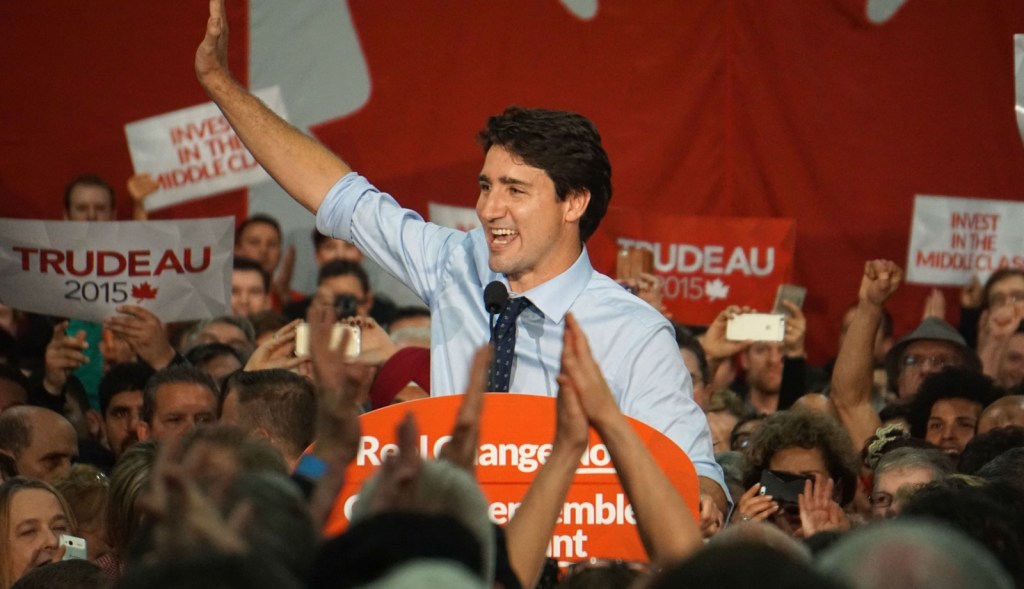Having your electoral process subverted by a shifty foreign power is a hot political trend around the world, but Canada has felt left out. But not anymore. A “bombshell” report submitted to Elections Canada alleges that buckets of unaccountable foreign cash were funneled into Canada through third party organizations like the Tides Foundation and Leadnow, who in turn tipped the results of the 2015 federal election in favour of the Justin Trudeau Liberals.
Huge if true, as we say in the biz. But it’s probably not. Here’s why.
Videos by VICE
Unsurprisingly, Canada Decides—the group behind the “bombshell” report—is run by three people with significant connections to the Tories: former Conservative MP Joan Crockatt, who narrowly lost her seat in 2015 to Liberal Kent Hehr; Brent Chapman, the husband of former Conservative MP Kerry-Lynne Findlay; and Chad Hallman, a 20 year-old political science undergraduate and conservative campus activist at the University of Toronto.
Allegations of foreign money influencing Canadian politics goes back quite a way in Conservative circles. In 2012, then-Natural Resources Minister Joe Oliver warned that radical environmentalists, funded by foreign special interest groups, were seeking to undermine Canada’s petroleum sector. (Environmentalist charities and advocacy groups who opposed the Conservative government were later disproportionately targeted for auditing by the Canada Revenue Agency, a practice that the Liberal government has since rolled back.)
Claims about foreign financing in the 2015 election in particular were first floated by right-wing activist Ezra Levant during the campaign, and by other Rebel commentators in the immediate aftermath. The story also occasionally resurfaced in other right-leaning outlets. The specific claims here, echoed by the Canada Decides report, is that rich liberal activists in the United States, including Illuminati puppet-master (((George Soros))), supplied anti-Conservative organizations as a way of circumventing laws limiting or prohibiting direct political donations.
Whereas donations to individual candidates or political parties are banned for corporations and trade unions, and strictly capped to $1,550/year for individuals (to a given political party or a given riding association), the rules are much more slack around third parties like charities or other non-profit organizations. Donations to these groups are limited within six months of the writ dropping—which includes a ban on foreign money—but otherwise there is no cap on how much money they can accept from anyone, anywhere.
There are definitely issues with political financing in Canada. But there is little indication that “foreign money” swayed the 2015 federal election as dramatically as the report suggests.
For one, although the amount of money that can be donated to a third party outside of an active election season is theoretically infinite, what can be spent during an election is strictly limited. Third parties are capped at $439,410.81 on advertising during an election, and they are limited to $8,788.22 in any given riding. In an interview with Yahoo! in August 2015, University of Toronto political scientist Nelson Wiseman suggested that these caps likely played into Stephen Harper’s motivation to call an early and prolonged election campaign. The long campaign not only restricted how much money could be given to third party organizations, but also meant that groups would have to make that $8,788 per riding stretch much further, meaning they would drastically limit the work such groups could do.
The case of Leadnow, one of the groups specifically referenced both in the Canada Decides report and right-wing discourse more broadly, is particularly interesting here. Leadnow is an “anyone but Conservative” activist group who coordinated a strategic voting initiative in 2015 in 72 Tory swing ridings across Canada—that is, ridings where Conservatives won the seat by less than 15 percent of the vote in 2011, or where a Liberal, NDP, or Green MP had won against a second-place Conservative by less than 5 percent. Their stated aim was to support the candidate from whichever party their polling suggested would be most likely to beat the Tories in a given riding. They targeted 11 ridings in particular as high priority (where activists campaigned directly on the ground by canvassing, polling, etc.) and endorsed candidates in a further 18.
Although candidates who received recommendation or support from Leadnow won in approximately 82 percent of their ridings, the campaign admitted in its 2015 post-mortem that it was difficult to accurately assess just how much of this was a direct result of the Leadnow’s activity. The lasting success of Leadnow on Canadian politics is also suspect. They helped elect the Liberals on the assumption that it would usher in progressive environmental policies and electoral reform, so, it’s unlikely that the international cabal of wealthy, oil-hating communists got a good return on their investments anyway.
We can also see exactly how much money third parties spent in the election—just $137,545.75, nation-wide, in Leadnow’s case. The Avaaz foundation, which is a left-wing organization based in New York which has a Canadian chapter, also registered as a third-party advertiser, but spent a paltry $24,458.22. Greenpeace? $2,887.58. Ecologist group 350.org? $1,098.61.
By comparison, the Conservative Party spent nearly $20 million on advertising over the course of the election, not including what local campaigns spent.
So while a review on tightening political financing rules in Canada is always welcome—especially at the provincial level—it’s pretty unlikely that Canada Decides is blowing open a major story or undermining the legitimacy of the last federal election. But with the Liberals now poised to bring in reform on the exact sorts of problems the report highlights, its authors may just get their wish.
Isn’t democracy grand? Quite a steal if you ask me.
Follow Drew Brown on Twitter.




